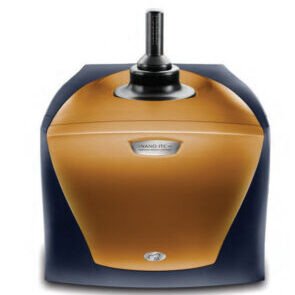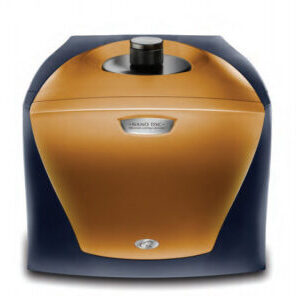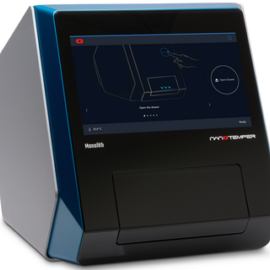
Biophysics
Contacts
Faculty Scientific Advisers
Location
Campus Address
Biology Physics Building
Room G05
Storrs Campus
Mailing Address
Storrs, CT 06269-3125
Instrumentation

Nano-ITC (Isothermal Titration) Calorimeter
ITC is a quantitative technique that can directly measure the binding affinity, enthalpy changes, and binding stoichiometry of the interaction between two or more molecules in solution. From these initial measurements Gibbs energy and entropy changes can be determined in a relatively straightforward manner.

Nano-DSC (Differential Scanning) Calorimeter
DSC is a thermo-analytical technique which can be used to monitor phase transitions in different systems. The Nano-DSC is specifically designed to determine the thermal stability and heat capacity of proteins and other macromolecules in dilute solution, with versatility to allow the screening of ligands and pressure perturbation measurements.

Monolith NT.115pico (MST)
The Monolith system provides fast and highly sensitive detection and quantification of molecular interactions in glass capillaries. This user-friendly system uses MicroScale Thermophoresis (MST) to obtain binding parameters such as dissociation constants (Kd) or EC50 values in a high-throughput manner.
Data used should cite the S10 grant the instrument was purchased with: S10OD028574 awarded to Dr. Heidi Erlandsen of the Center for Open Research Resources and Equipment at the University of Connecticut. Please email victoria.robinson@uconn.edu with any work or citations using MST data from this instrument.
Analytical Ultracentrifugation
G05 of the Biology/Physics building also houses two Beckman XL-I analytical ultracentrifuges, one of which is equipped with an Aviv AU-FDS fluorescence detector, using HeteroAnalysis, and an Optima analytical ultracentrifuge. These are not supported by the Biophysics facility and are available on a self-service basis at no charge. Prospective users with any questions should contact Dr. James Cole james.cole@uconn.edu.

Services & Rates
Service & Rates
The Biophysics Facility offers training and access to calorimetric and novel thermophoretic techniques. Approved users can independently use equipment by making reservations on CIDER, and billing is calculated by CORE.
- Consultation, training, and assistance for microcalorimetry and microscale thermophoresis instruments is available
- Fee-based use for approved users on equipment is available 24/7
- TA Instruments’ NanoAnalyze software for NanoDSC and NanoITC analysis is available to download from the TA Instruments’ website
- Monolith Analysis software, which fits runs to dissociation constant (Kd) or Hill model (EC50) is available on the Monolith NT.115pico PC laptop for use for free
Research Potential
Nano-ITC and Nano-DSC Calorimeters:
The complete thermodynamic profiles of the interactions in question are of enormous value in drug design because they provide information about the balance of driving forces that cannot be obtained from structural or computational methods alone.
ITC applications for studying macromolecule/small molecule and macromolecule/macromolecule binding reactions include measurement of:
- Binding constant
- Stoichiometry
- Enthalpy-entropy compensation
- Environmental effects on binding
- Enzyme kinetics
DSC applications for macromolecular characterization include the studying of:
- Stability
- Unfolding
- Domain structure
- Interactions with membranes
- Binding
NanoTemper Monolith
The Monolith instrument measures molecular interactions based on the theory of microscale thermophoresis (MST), or the change in mobility of a molecule due to the property changes under an IR-induced microscopic temperature gradient. The Monolith has a large application range, ability to detect picomolar affinity, low sample volume requirement, and fast measurements of up to 16 samples.
MST applications for binding measurements determined by the Monolith include:
- Affinity
- Stoichiometry
- Enthalpy
- Enzyme kinetics